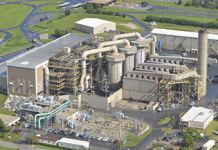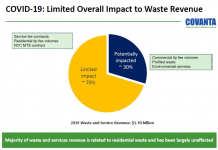by Debra Fiakas CFA
![320px-Shanghaiairpollutionsunset[1].jpg](http://www.altenergystocks.com/wp-content/uploads/2017/08/320px_Shanghaiairpollutionsunset_1_.jpg) Shanghai at sunset as the sun fades into the smog. Photo source: Suicup |
China’s industrial pollution problems are mounting. Global emissions of carbon dioxide (CO2) increased by 3% in 2011, reaching an all-time high of 34 billion tons. China contributed a whopping 29% of that carbon dioxide – nearly twice that of the second worst polluter, the U.S., which spit out 5.4 million tons or 16% of the total CO2 emissions.
Policy makers in China have been slow to move against industrial polluters out of concern for stalling economic growth the country badly needs to provide room and board for its 1.4 billion people. Still there is a building waste reclamation and recycling sector. One of the private sector leaders, China Recycling Energy Corp. is listed on Nasdaq under the symbol CREG after one of those reverse merger transactions that got so much attention a few years back. The company designs, commissions and eventually sells waste processing and waste-to-energy systems to China’s industrial sector.
One of its newest partners is China Guangdong Nuclear Energy (CGN) located in the province of the same name. The two have pledged to jointly construct waste-to-energy projects. With financing resources getting tougher to come by in China, partnerships might be a smart way to keep the top-line growing. In August 2013, China Recycling announced approval of a planned fund to invest in energy recovery and waste heat power generation projects. Its partner in that effort is Hongyuan Huifu Venture Capital.
CREG shares might seem to be selling a bit dear at 18.2 times trailing earnings. The company earned $0.14 per share on $29.0 million in total sales in the most recently reported twelve months. Operating cash flow generation of $5.5 million or $0.11 is even less impressive. China Recycling does not even have a clean balance sheet. There is $63.2 million in debt outstanding – about equal to equity.
A premium valuation is all the more surprising given China’s reputation for cooked books and sham businesses. I am still stinging over a fouled play on RINO International, an environmental clean-up operation that falsified contracts and revenue. Earlier this year executives of that company – a husband and wife team – agreed to reimburse investors for funds $3.5 million taken from shareholders to pay for homes, cars and clothing.
As beguiling as environmental clean-up might be for the civic minded investor, before taking a position in China Recycling Energy investors need to look closely at corporate structure and audited financials. Granted China Recycling is not a family operation like RINO International. Its auditor, Goldman Kurland and Mohidin, is a member of the BDO Seidman Alliance and has bilingual auditors among its ranks. Unfortunately, GKM partner Ahmed Mohidin was once employed by Kabani & Company, one of the U.S. auditing firms that has been suspected of passing over questionable financial records.
Debra Fiakas is the Managing Director of Crystal Equity Research, an alternative research resource on small capitalization companies in selected industries.
Neither the author of the Small Cap Strategist web log, Crystal Equity Research nor its affiliates have a beneficial interest in the companies mentioned herein.







